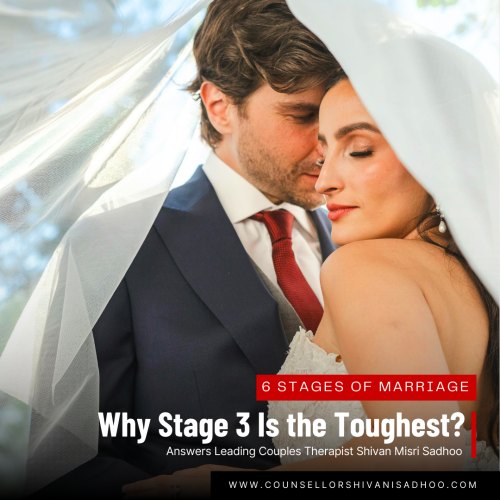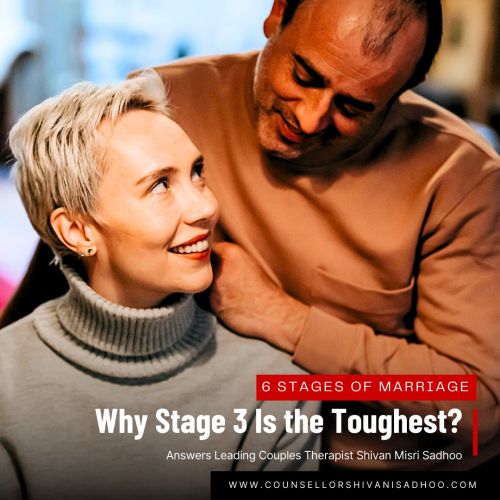What are the 6 Stages of Marriage? Why Stage 3 is The Toughest?
Marriage is a journey full of growth, discovery, and sometimes challenges that test the bond between two people. While every relationship is unique, most marriages tend to go through recognisable stages. Understanding these phases can help couples navigate difficulties, strengthen their connection, and set realistic expectations, says Shivani Misri Sadhoo, a leading relationship expert and one of the top marriage counsellors in Delhi and India.
Questions You Might Ask
1. Why do couples often face the most difficulties in the early years of marriage?
Many challenges emerge as couples move beyond the initial excitement of marriage into the realities of everyday life. Differences in habits, communication styles, and expectations can surface, often leading to conflict if not addressed consciously.
2. Can a marriage survive Stage 3, the Power Struggle?
Yes. Stage 3 can feel intense, but with open communication, mutual understanding, and a willingness to grow, couples can emerge stronger. It’s less about avoiding conflict and more about learning to navigate it together.
6 Stages of Marriage, as explained by couples therapist Shivani Sadhoo
Stage 1: The Honeymoon Phase
This is the period of excitement and idealisation. Everything feels new and thrilling, and couples often overlook imperfections as they focus on love and connection.
Stage 2: Reality Sets In
As the initial excitement fades, differences between partners become more apparent. Habits, routines, and even quirks that were previously endearing can now feel challenging.
Stage 3: The Power Struggle
Often called the toughest stage, this is when conflicts and disagreements become more frequent. Couples question whether the marriage will last and confront unresolved personal or relational issues. The emotional intensity can feel overwhelming, but it’s also a stage that provides the opportunity to build resilience and a deeper understanding if navigated consciously.
Stage 4: Rebuilding and Acceptance
After working through conflicts, couples start to regain trust and understanding. Acceptance of each other’s differences and the ability to compromise strengthen the foundation of the relationship.
Stage 5: Deep Connection
By this stage, couples often feel a profound emotional and spiritual bond. They communicate more effectively, support each other’s growth, and share a sense of partnership that goes beyond surface-level romance.
Stage 6: Legacy and Purpose
Here, couples focus on building something bigger than themselves, whether it’s family, community, or shared goals. There’s a sense of fulfilment in contributing together and leaving a lasting impact.
Identifying Your Stage
Recognising which phase your marriage is in can help you manage expectations, enhance communication, and approach challenges more intentionally. If you find yourself in Stage 3, remember that feeling tested doesn’t mean failure—it’s an opportunity for growth.
Strategies to navigate Stage 3 include:
- Seeking couples therapy or professional guidance
- Reconnecting emotionally and fostering intimacy
- Prioritising personal growth alongside relational growth
- Learning constructive conflict resolution techniques
Marriage isn’t a final destination but an ongoing journey. Each stage has its purpose, and even the toughest periods, like Stage 3, can strengthen the bond between partners when approached with patience and commitment.
- Are You an Echoist? How It Differs from People-Pleasing - February 27, 2026
- What Is “Friendfluence,” One of the Top Dating Trends of 2026? - February 23, 2026
- Why Chocolate is the Ultimate Symbol of Love? Answers Expert - February 13, 2026




